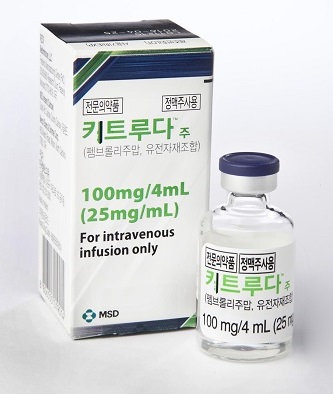Following AbbVie's autoimmune disease treatment, Humira (ingredient: adalimumab), Keytruda (ingredient: pembrolizumab), an immunotherapy drug from U.S. company MSD, also known as Merck in the U.S. and Canada, has emerged as the next crown jewel for biosimilar development.

In Korea, Samsung Bioepis, Celltrion, and Chong Kun Dang have entered the fray.
Keytruda is an immunotherapy that activates the body's immune system to attack cancer cells, which has garnered attention for minimizing side effects compared to conventional cancer treatments.
The FDA and the Korean Ministry of Food and Drug Safety (MFDS) first approved it in September 2014 and March 2015, respectively, as a treatment for metastatic melanoma.
In addition, Keytruda holds indications for a wide variety of cancers, including non-small cell lung cancer (NSCLC), head and neck cancer, Hodgkin lymphoma, urothelial carcinoma, esophageal cancer, renal cell carcinoma, endometrial cancer, colorectal cancer, breast cancer, and cervical cancer.
With its broad indications and treatment record, Keytruda generated revenues exceeding 27 trillion won ($20.8 billion) worldwide last year, and the industry expects it to grow further. In Korea, its inclusion as a first-line treatment in health insurance coverage for various cancers in recent years is anticipated to boost sales.
Consequently, companies from Korea and around the world are venturing into developing biosimilars for Keytruda as the drug's patent is set to expire in the U.S. in 2028 and EU in 2030.
Most recently, Samsung Bioepis received approval from the MFDS for phase 1 clinical trials of SB27, its Keytruda biosimilar. This is the first time a Korean company has received clinical approval for a Keytruda biosimilar.
The clinical trial is designed to compare the pharmacokinetics, efficacy, safety, and immunogenicity of SB27 compared to Keytruda in patients with NSCLC. The trial will be conducted at nine institutions, including Samsung Medical Center.
Celltrion expressed its intention to develop a biosimilar for Keytruda in 2018 and is currently developing the substance.
Notably, Celltrion has successfully transitioned drugs like Remsima from the conventional intravenous (IV) injection method to a more accessible subcutaneous (SC) injection form for global marketing. This approach is believed to be applicable to its Keytruda biosimilar as well.
Chong Kun Dang acquired the domestic rights to a Keytruda biosimilar from Favorex, a Singaporean pharmaceutical company, in September last year and is currently conducting preclinical trials.
Based on the preclinical trial results, they will apply for phase 1 clinical trials.
"However, MSD is also planning to postpone the launch of biosimilars through various methods, including patent defense and extension. This strategic move is prompted by the fact that Keytruda accounts for about 30 percent of its total sales.

According to reports, MSD has registered 53 patents related to Keytruda. Additionally, as of October 2021, it has filed for 129 more patents, more than half of which were filed after the initial approval, with patents related to formulations unrelated to the core antibody accounting for 74 percent of these applications.
MSD is also developing a SC form in preparation for expanding the patent expiration of Keytruda.
If these patents are registered, the patent period for Keytruda could be extended beyond 2036.
"MSD, as well as biosimilar companies, are paying close attention regarding the possible impact of if new patents, such as the subcutaneous injection formulation, are added to Keytruda, which currently has a patent duration until 2028," an industry official told Korea Biomedical Review.
Related articles
- What impact will Keytruda have on treating advanced gastric cancer?
- [ESMO 2023] Keytruda-Padcev combo takes 'crown’ as 1st-line cure for urothelial cancer
- Korea-led Keytruda clinical trials to add option for stomach cancer
- Keytruda’s reimbursing attempt for 13 indications fails to surmount 1st hurdle
- Celltrion confirms efficacy of Eylea biosimilar at EU meet
- MSD's Keytruda wins 2 new approvals for 1st-line gastric cancer, early-stage lung cancer
- Korean biosimilars of Humira step up offensives in domestic market
- Samsung Bioepis begins P1 trial of Keytruda biosimilar

